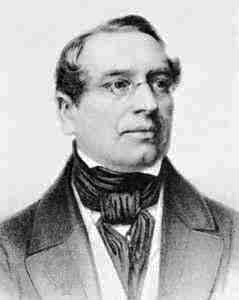| Profile | Major Works | Resources |
Johann Karl Rodbertus-Jagetzow, 1805-1875

Johann Karl Rodbertus-Jagetzow (also known simply as "Carl Rodbertus") was Prussian economist and "scientific" socialist.
Robertus was born in a wealthy Prussia family, the son of law professor at Greifswald. Rodbertus studied law at Göttingen und Berlin and then philosophy in Heidelberg. Rodbertus took on a variety of civil service posts, which provoked his interest in socialist and economic questions. He was much influenced by Saint-Simon.
In 1835, the still-young Rodbertus bought the Jagetzow estate in Pomerania, and settled down to the quiet life of landed proprietor. Rodbertus dedicated himself to economics. Rodbertus's first major contribution appeared in a famous 1839 article, which was then expanded upon in his 1842 Erkenntnis book. Here, Rodbertus picked up the Ricardian labor theory of value and deduced a rudimentary version of Marx's theory of surplus value from it, arguing that whatever value labor produces beyond that necessary for its subsistence is, in effect, a "rent" appropriated by the capitalist. (Rodbertus's followers would later accuse Marx of plagiarism, a charge which Engels took pains to dismiss). On this premise, Rodbertus reached the "scientific socialist" conclusion that workers were thus entitled to the "unpaid" fruits of their labor.
However, the Pomeranian landowner was no revolutionary. Rather, Rodbertus was one of the earliest advocates of " state socialism", i.e. state provision for the working classes, that was later taken up by Lassalle, Wagner and the German Historical School. The objective, as Rodbertus himself explained, was to "save capital from itself" -- i.e. prevent "revolutionary" uprisings by alleviating the "crimes" of private property by redistributive taxation, propping up wages, promoting agrarian reforms, etc. He tried to put some of his reforms into practice in 1848, when he joined the Prussian Landtag, organized the Reform Party and served as a minister in Hansemann's short-lived liberal government.
Rodbertus predicted the collapse of private property, but saw this as a gradual process not a revolutionary one (he estimated it would take some five centuries!). Also notable, in a series of letters (Soziale Briefe, 1850-51), Rodbertus formulated an underconsumption theory of crises along the lines of Sismondi. He argued that as wages -- dominated by "subsistence" laws -- do not grow at the same pace as productivity, capitalism has a tendency to produce more goods than there is demand for. The falling labor share in income, Rodbertus concluded, is the principal cause of economic crises. State socialism, by promoting labor's share, would thus be also beneficial to the economy as a whole.
|
Major Works of Karl Rodbertus
|
|
HET
|
|
Resources on Karl Rodbertus
|
All rights reserved, Gonçalo L. Fonseca
